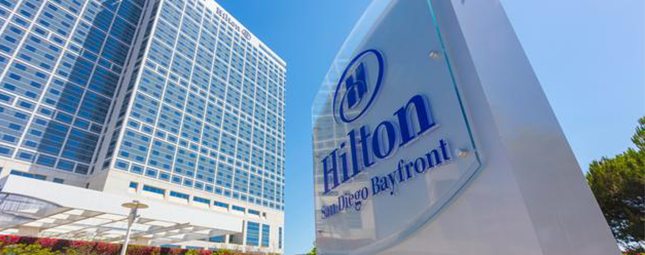How the Hilton San Diego Bayfront achieved massive food waste reductions

The Hilton San Diego Bayfront, a 1,190-room luxury hotel on the city’s waterfront, has been tracking food waste with Leanpath for only five months, but has already seen a dramatic reduction in food waste: a 50% drop in waste by weight and 51% drop by waste value.
Executive Sous Chef Ryan Hetherington drove adoption and implementation of the system, which was made possible through Smart Kitchens San Diego, an innovative initiative developed by the San Diego Food System Alliance. Thanks to grant funding from the California Department of Resources Recycling and Recovery (CalRecycle) through California Climate Investments, Smart Kitchens San Diego engages 15 of San Diego County’s largest institutions, providing them with Leanpath food waste tracking technology and connecting them with local nonprofit recipients for food donation.
Hetherington admits he was unsure if automated food waste technology would live up to its promise. “Could this really show a quick turnaround and quick results for us?” he remembers thinking. “Were we going to get full participation from the staff?”
After five months: “It’s gone great.”
HSDB’s Path to Success
Get your team engaged
Hetherington is passionate about food waste prevention. He knew that he needed to convey that passion to his team to get their buy-in. “I wasn’t going to be able to tell them, this is how it’s going to run. I needed their help and their buy-in.” He convened a group of his fellow sous chefs and with their input developed SOPs for ensuring all food waste is weighed. He then took that to the larger kitchen crew, showed them how all food waste would be weighed and then explained why they were doing it. “We didn’t talk too much about the financial side, but how much it means as an environmental and community service. We have huge staff engagement.”
Identify focus areas
Leanpath data showed Hetherington and the team that they were racking up a lot of fish waste. The data also showed them why: overproduction. They took three actions. First, they set a kitchen-wide goal to reduce fish waste by 50% to get everybody focused. Second, they reexamined catering orders, and found that with one of their largest regular catering groups, their ratios were off: they were producing too many fish entrees and not enough chicken. They worked with the group to adjust their orders going forward. Finally, seeing they were throwing away a lot of ceviche, they realized production sheets weren’t being followed: line cooks were producing extra to ensure they didn’t run out. Staff were retrained. Ultimately they surpassed their goal with a 67% reduction in fish waste.
Start conversations
Leanpath data helped to identify focus areas, but it also quickly spurred a more food waste-focused culture in the kitchen. Hetherington and the team will use scans of the cooler as an opportunity to problem solve. “When we see stuff that expired, we’ll sit there and talk about it. What could we have done to avoid that? Why was this in the cooler for four days without being repurposed.” He’ll also intercept staff at the Leanpath tracking station to increase awareness: “I say, ‘What are we going to do in the future to avoid this [going to waste]? You have diced tomatoes that are moldy now and have to be thrown away. We could have easily turned this into salsa.’” It was through these conversations that the staff came up with a repurposing idea for overproduced pastries: turn them into Bread Pudding French Toast. Pastry waste gone!
Leverage the value
Food waste prevention brings real financial value: you are able to produce less food, which means you can buy less food, lowering food purchase costs. But, as Hilton San Diego Bayfront Executive Chef David Scalise explained, there are also marketing benefits. “Groups will do site visits,” he says. “They’ll visit three hotels and pick which one they’re going to hold their event. We have groups that ask specifically about our sustainability efforts.” Scalise now discusses the hotel’s food waste prevention program with Leanpath. “We’re a business, and we want to use anything we can to have an advantage over the competition.”
Learn how foodservice operators around the world use Leanpath to prevent food waste.

